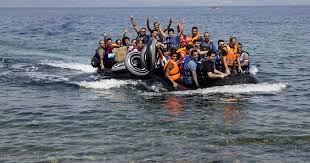
Europeans No Longer Welcoming Immigrants with Open Arms
European Youth Turn Against Immigration
In Hungary, Kitti, a 28-year-old sports teacher and mother of an eight-year-old girl, says, “I went to the main railway station in the summer to help migrants.” But since then her heart has hardened.
“I think we need to stop them coming, they think differently from us, especially when it comes to women.”
She cites the notorious drunken gang assaults on women in Germany’s Cologne and Hamburg during the New Year festivities. She describes herself as a progressive in politics, but backs Hungary’s controversial prime minister, Viktor Orbán, in his demand that Europe staunch the flow of refugees and migrants.
To the north of Hungary, anti-migrant protesters in Poland took to the streets Sunday to echo Kitti’s fears. The protesters at Gora Kalwaria, 30 kilometres south of Warsaw, said they feared for women and children after the New Year’s Eve sex attacks in Germany. Full Story
Hardening attitudes toward migrants in Switzerland
Switzerland does not have enough home-grown doctors so nearly a third are European Union citizens even though it is not a member of the 28-country bloc.
Those doctors and other foreigners, many of whom have well-paid jobs, benefit from a 1999 deal allowing workers to move freely between the EU and Switzerland. Now, some Swiss say so many foreigners have arrived that locals are losing out on good employment and a quality of life.
Such resentment echoes around Europe and is playing out in domestic politics from Austria to Britain. It has helped a populist Italian coalition gain power, imperiled German Chancellor Angela Merkel’s government and contributed to Britain’s decision to leave the EU.
On Wednesday the Swiss cabinet starts considering whether to push on with talks on a new treaty that could reset business and diplomatic rules for decades.
Brussels says Switzerland must replace more than 100 separate accords with a treaty. If the talks, which have dragged on for over four years, produce any deal, it would face a Swiss referendum. Full Story
Other stories of Interest
Everything You wanted to Know about Mass Psychology
Sayings that matter by Sol Palha


